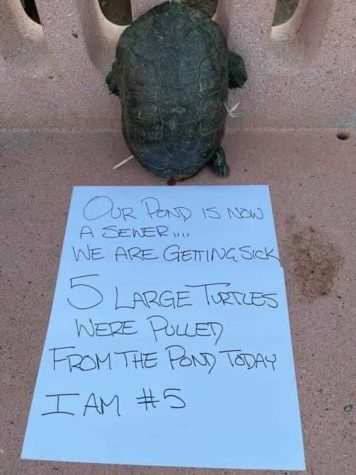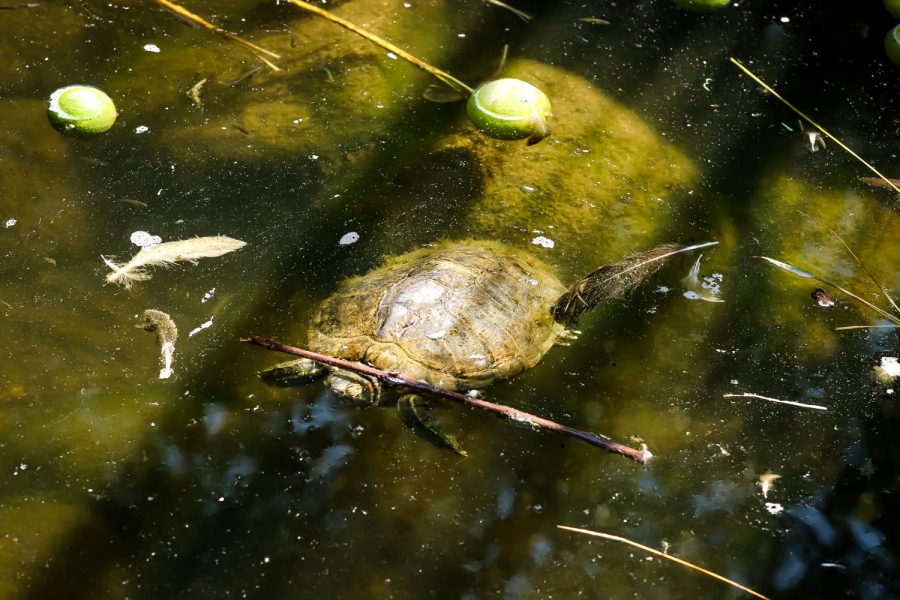CSUN Orange Grove pond’s murky and stagnant waters spark public outcry
September 24, 2021
In our own backyard at CSUN, an issue plagued the Orange Grove pond for the past few months. The water in the pond became polluted, causing backlash among members of the community, many of whom believe the water quality killed some of the turtles there.
At the beginning of September, several members of the Facebook group Friends Of The CSUN Pond began complaining about the pond’s conditions. They said the water had become infested with algae and debris, likening it to “pea soup.”
Community members flooded Physical Plant Management with numerous email complaints, demanding that the pond be fixed. A few of the complaints were directed at Jason Wang, the senior director of PPM, who is responsible for overseeing the entire campus.
Some of the group’s complaints included: “Why hasn’t this been finished? We are all aware that the heat brings algae blooms. This happens EVERY YEAR. Why weren’t there preparations put in place?”

Another community member said, “I pulled a dead turtle out. Its body was all bloated and swollen, but no visible evidence of trauma. How did it die? I saw a second dead turtle drifting in the pond, but beyond my reach. Then I found a 3rd dead turtle, with no head.”
According to a source, CSUN’s pond is artificial and relies on pumps, which need maintenance. Without maintenance of the pumps, the filtration system never worked, making the water stagnant and sewer-like.
After numerous complaints, the pipes were fixed during Labor Day weekend.
In response to the complaints, Wang outlined the cause of the issue to the group of concerned community members and the solutions that were being done to resolve the situation.
Earlier this year, an independent contractor was hired to fix the pumps. Due to the contractor working by himself, it caused a delay in the pond’s maintenance. The lack of both water circulation and communication on the status of the pumps led to the water level dropping and the overall quality worsening.
Wang said he takes responsibility for this situation as it is the responsibility of the PPM to take care of issues like this.
He admits there could have been a number of different factors that led to this, be it the ground staff, assistant directors or trade staff who were down there.
In terms of the turtles’ injuries, Wang maintained that it is not an issue of the water quality. He believes the issue with the turtles is largely due to human factors, such as the abandonment of the turtles at the pond. When those turtles grow up, they are abandoned and dumped in the pond, according to Wang.
CSUN’s biology department has tagged the non-native reptiles to check their lifespan, but Wang said they aren’t supposed to live there. According to him, the pond should only be a resting spot. Additionally, the mallards and the domesticated ducks — which are suspected to be dumped by humans too — should only be there for rest as well.
Wang stated that they have concluded the turtles and domesticated ducks were dumped because they “are not indigenous to the [San Fernando Valley and] neither species are migratory.” Additionally, he stated that based on the assessment of the biology department, the rate that the turtles grow doesn’t line up with “natural reproduction.”
Lastly, turtles born in the wild are normally scared of humans, whereas many of those in the pond aren’t scared, which indicates they “may have been handled [by humans] regularly.”
Wang said that people are also creating an “artificial food source” by feeding the animals, which is increasing the amount of wildlife coming to the pond and impacting the pond’s quality.
While Wang believes the turtles are being abused by humans, one community member argued that there is “no evidence that [the abuse] was caused by vandals, or mischievous youths,” and they assumed the injuries to the turtles are caused by a potential “predator.”
Wang said he is open to meeting with any members of the community to discuss the situation in detail. He said that PPM is committed to keeping the pond in shape and accepts it was an error on their part in not responding fast enough.
There are currently plans to add two more pumps in order to oxidize water and to add beneficial bacteria for the water when algae grows during the heat.
A budget is being constructed for a funding request to hire different positions to help keep the pond running smoothly. Wang anticipates PPM will perhaps get a portion of the money requested. He stated that the proposed budget would be at least $100,000 to $250,000 in total per year.
Wang’s message to the public is to come to the pond but to do it responsibly. Additionally, if anyone sees anything suspicious, he is asking the public to reach out early, and let PPM know, through the PPM extension number or via email.
